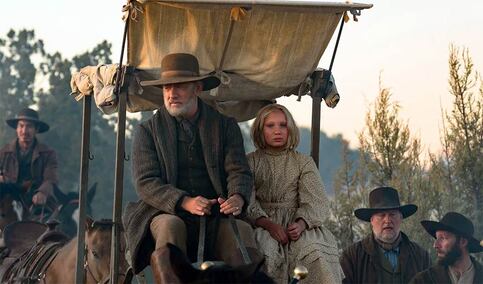B | A frontier newsreader is tasked with delivering an orphan girl to her relatives. Directed by Paul Greengrass Starring Tom Hanks and Helene Zengal Review by Jon Kissel |

That’s not to say the film is lacking for darkness. In the film’s version of Texas, Union soldiers have a lockdown on the population, seeing as it just took up arms against the US. During Captain Kidd’s (Hanks) readings, the crowd can easily be set off against the yankees. Outside of the larger settlements, lawlessness and exploitation are common. Kidd runs into lynched Black men and marauders who control the roads. Greengrass’ vision is of a dangerous and unsettling civilization that has demonstrated a prior willingness to commit monstrous crimes on a vast scale, so what value does a lone man of no broader affiliation or loyalty carry? The West, especially in this period fresh off the civil war, was a time when any interaction could lead to fists or bullets, and Greengrass ably sculpts how cheap life can be.
A survivor of the carnage provides Captain Kidd with a purpose beyond reading the news. He comes across Johanna Lengenberger (Helena Zengal) alone in an overturned carriage, and brings her back to the nearest town. Orphaned twice, once by a Kiowa raiding party that killed her German immigrant family and again by the US Army when they cleared out a Kiowa village, Johanna speaks a smattering of German and plenty of Kiows, though no English. Kidd takes it upon himself to bring her to surviving relatives over repeat warning about how dangerous the road will be. This part of News of the World is a recognizable story, and the film doesn’t revolutionize it nor does it tie the news part of Kidd’s life to his potential to be a surrogate father. However, it is a familiar story told with emotion and passion, not unlike the way that Kidd reads the news. Johanna’s childish petulance is turned all the way up, and it’s balanced by a competence that she shares with Kidd. Both save each other’s lives, more than once, and both can’t help but get closer to each other.
An intelligent person like Kidd must recognize that he’s surrounded by history at this time in Texas, having so recently played a small part in the shaping of it. A monumental event just wrapped up, and he’s traveling a territory in the middle of huge population shifts and rapid growth. The most writerly part of News of the World is the comparison between the white way of thinking about the world and the Kiowa way, as described by Johanna. For the momentous times that Kidd lives in, their trauma means that the only way is straight ahead. Don’t veer off the path, don’t turn around, just keep moving forward. This focus spurs Americans towards progress and wealth but also emptiness and tunnel vision and arrogance. Johanna describes the Kiowa way as circular, respectful and cognizant of what came before while having no destination in the future. They exist on a continuum as opposed to some far off place. It’s a perceptive way to describe Americans and a non-patronizing way to describe Native beliefs, all contained within a compelling package led by one of America’s most beloved messengers. B
 RSS Feed
RSS Feed